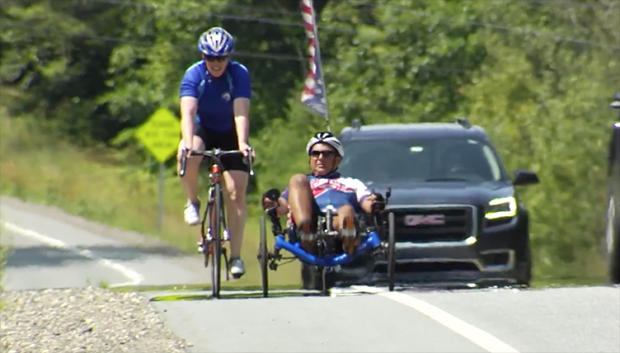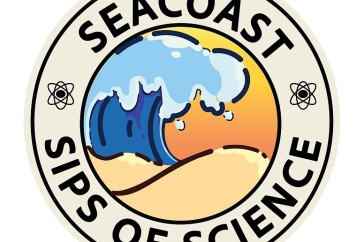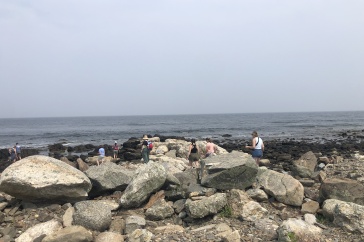
Jack Pillsbury is a combat veteran whose three tours of Vietnam left him with symptoms of post-traumatic stress disorder. Until two years ago, that long-ago war was still affecting his life. Then he met Cathy Thompson.
Thompson is the director of PATH™ (Promoting Access Transition and Health), a home-based therapy program that engages clients in recreation within their communities to aid them in making social and emotional changes that can lead to improved overall health. It was started by Northeast Passage, UNH’s nationally recognized therapeutic recreation and adaptive sports program. Pillsbury credits both programs with helping to draw him out and overcome his PTSD.

“I was pretty much in a shell,” Pillsbury says. “I can’t thank Cathy and Northeast Passage enough for helping me get out of it. I went over to Vietnam when I was 18; I was a kid. At that age, that kind of experience — it sticks with you.”
Pillsbury and Thompson went cycling, swimming and hiking. Through it all, they talked. “I didn’t think of it as therapy but as I look back, I guess it sort of was,” Pillsbury says. “The talks we were having and the things we were doing — it put all that other stuff in perspective.”
For veteran Melinda Simms, PATH™ provided the opportunity to go outside her boundaries and try things she’d never tried before. “I felt with my disability I was bound up in a box,” she says. “But Airi, my recreation therapist, opened my eyes to new and wonderful possibilities.”
“At Northeast Passage we pay close attention to what veterans are saying: Where are the challenges? And then, we use the skills we have honed to address these concerns and empower each veteran to live healthier, happier lives.”
And that is just what the research revealed: People feel better when they engage in activities in their communities.
PATH™ grew out of research Northeast Passage conducted in 1998 with individuals who had experienced spinal cord injuries. The results revealed that the program increased participants’ self-confidence, improved their quality of life and reinforced the connection between their actions and their health. On the strength of those outcomes, Northeast Passage developed partnerships with Martin’s Point Health Care in Portland, Maine, and the Veterans Administration in Manchester, N.H. that continue today.
In 2014, thanks to an adaptive sports grant from the U.S. Department of Veterans Affairs, Northeast Passage extended the scope of PATH™ to veterans with all types of disability. Within the first three months, the program had received 70 referrals from mental health affiliates throughout New Hampshire, and in 2017, 139 veterans received 352 home visits, totaling 773 treatment hours.

Program director Thompson notes that the PATH™ model has been developed hand-in-hand with research. “Over the years, we have seen consistent impact and positive outcomes of this intervention regardless of the person’s disability or combination of health conditions,” she says. “It reinforces the strength of this recreational therapy intervention and the importance of meeting with people in their daily community to create solutions.”
A 2017 UNH study conducted with veterans from the Manchester VA Medical Center who had completed PATH™ confirmed the earlier findings, also indicating a significant change for the better.
The study showed significant signs of improvement in health satisfaction and perceived quality of life as well as a marked change in leisure activities, despite chronic health constraints.
Themes that arose in an earlier qualitative study showed physical benefits of PATH™ participation, such as weight loss, functional fitness, lower blood pressure, decreased pain and decreased use of medication. PATH™ brought emotional benefits, too: higher levels of happiness, confidence, patience and self-acceptance.
“At Northeast Passage we pay close attention to what veterans are saying: Where are the challenges? What are the trends that are affecting them? And then, we use the skills we have honed as recreational therapists in the community to address these concerns and empower each veteran to live healthier, happier lives,” says Jill Gravink ’86, ’07G, founder and director of Northeast Passage. “Nowhere else in the country offers this home and community-based model of recreational therapy.”
In November 2017, that leadership in the field led Northeast Passage to become the first recreational therapy provider for the federal program Veterans Choice, the first-ever federal funding source to reimburse recreational therapy.
“This policy change represents an enormous shift in both recreational therapy services and veteran health care,”Thompson says.
The change also opened the door for PATH™ to expand beyond UNH and New Hampshire to organizations wanting to offer the program in their area.
“When I came home, there were real trust issues for me,” says Pillsbury, the Vietnam vet whose PATH™ experience with Thompson addressed the lingering mental health impacts of that war’s trauma. “And there was no place for us to go. There was no PATH™, no Northeast Passage, no Manchester
VA office. I’m so thankful for what we have now. This program has spilled over into my whole life. I’m doing things; I feel more comfortable around people. It’s changed everything.”
-
Written By:
Jody Record ’95 | Communications and Public Affairs | jody.record@unh.edu


















































